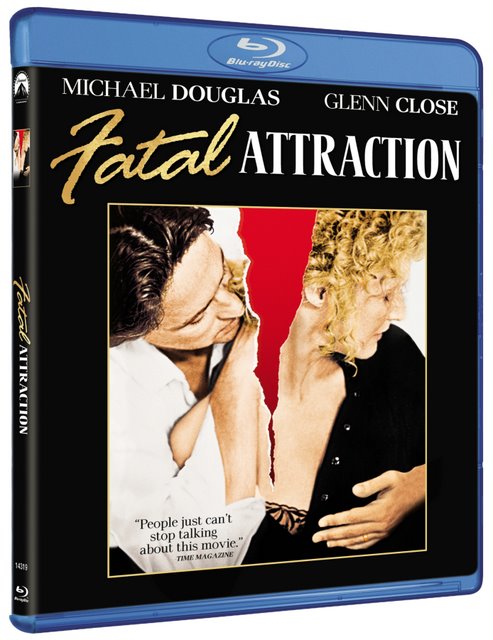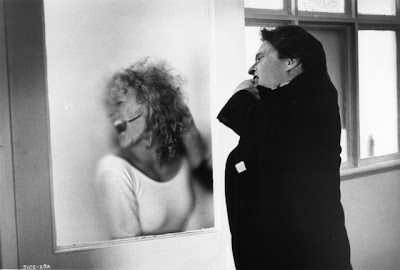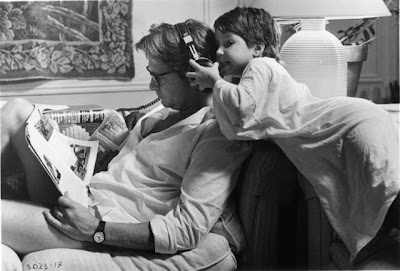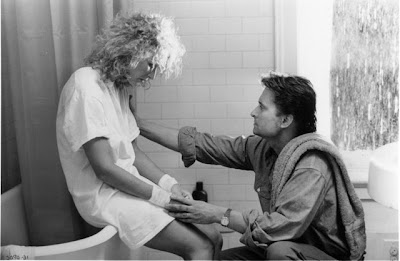
Now Available
Note: In-depth analysis - Spoilers Ahead Although the back of the box and indeed one of the film's taglines states that "one-night stands can be murder," the underlying theme of Fatal Attraction seems to be that sex is dangerous.
And with its release in 1987 where it became one of the highest grossing films of the year -- accumulating six Oscar, one Grammy, and four Golden Globe nominations -- the filmmakers note on the Blu-ray release just served up by Paramount Home Entertainment that this film touched a nerve they didn't expect.
Despite being based upon British filmmaker James Dearborn's acclaimed 1979 short work, the timeliness of its release in '87 cannot be understated in its success since --without a doubt -- the film frightened viewers even more in the wake of HIV and awareness of STDs which was quickly making the more free-loving, swinging decades of the '60s and '70s obsolete as new attitudes towards the behavior likened carefree sex to playing Russian Roulette.
While Michael Douglas's unfaithful husband Dan Gallagher fails to get caught in his infidelity and doesn't receive any literally transmitted diseases -- he does learn that casual sex is not as casual as he'd imagined when the sexually confident, icy blonde book editor Alex Forrest (Glenn Close) he cheats with when his wife's away turns into an unrelenting psychopathic stalker.
Still, it's argued in Fatal Attraction and even in most households at the start of the film -- before Alex turns into a wicked witch relatively on par with '80s horror franchise villains -- that since Dan made his own bed, he'll have to lie in it.
Yet this quickly changes when Alex escalates from a jilted and ignored woman scorned into a full-blown knife wielding female Norman Bates in a manner that sent shock waves through the feminist community as the Blu-ray reveals that some women viewed the work as yet another in a long line wherein single career women are punished and homemakers are deemed saintly.
While as a feminist, I know those female punishment movies as soon as I see them even when they're subtly dressed as comedies or light dramas -- to me, the character of Alex was so beyond anything remotely relatable (and in fact in some ways so desperately tragic) that I never viewed her as anything other than a woman who happens to be psychotic just like I believe both Glenn Close and one of Hollywood's most consistently successful producers, Sherry Lansing did as well.

Similarities to Clint Eastwood's (in my view) more misogynistic Play Misty for Me and a notable lack of heroes -- since it's pretty hard to root for a guy who deceives his beautiful wife (Anne Archer) and six year old daughter within the opening act -- made it the property that most studios were afraid to touch as the list of directors, stars, and companies who passed on the movie seems as though it could be a mile long.
However, despite its flaws, the movie succeeds more than Misty did by casting Michael Douglas as an "everyman" as opposed to Eastwood's smooth, seductive disc jockey even though Fatal's Dan is an everyman whose morals we learn are rather one-sided.

Understanding that the only way the movie would draw viewers in is if anyone in the audience felt as though what was happening to Dan could happen to each and every one of the viewers -- aside from Lyne's trademark over-emphasis on carnality at its most extreme -- for a majority of the film, it feels all too terrifyingly realistic.
Likewise, Lyne as well as screenwriters James Dearden and Nicholas Meyer earn points for showing things from Alex's demented side of the situation as well, which was immensely helped by Glenn Close's complete immersion in the character to the point that she'd created a psychologically fascinating back-story to Alex that may have made the film far more satisfying as it continued had this been revealed.
However, as critics including Roger Ebert who likened the last act and the evolution of Alex Forest's character to an adult version Paramount's wildly successful teenage hit Friday the 13th franchise argued -- once Alex begins going increasingly off the deep end -- the movie goes for cheap shocks instead of earned thrills whereas before we could at least understand both sides of the situation. And this was especially vital since it's a bit overly convenient for Dan not to feel more than just a little guilt or own up to the fact that what he did was a tremendous breach of marital trust and harmful to both himself and Alex.
Yet, instead of exploring the way that infidelity affects many more people than just the two who hop into the sack, Fatal Attraction literally pulls us along with Alex for a strange roller-coaster ride. But we still have to overlook some serious gaps in logic, wondering for example why Dan wouldn't have taken more precautions to move his family to a safer location, asked a friend (if the cops weren't willing) to help stand guard, hire a private investigator to study Alex in greater detail, etc.
Moreover, we have to wonder just what kind of odd cracked mirror we were looking into in the '80s when we realize that not only have we completely lost all sympathy (or at least a sense of sadness) for her side of the situation especially regarding the fact that she reveals a pregnancy that we're never given any reason to doubt but it's even more startling to learn that test audiences actually demanded an ending that would allow her to be killed in a gruesome way by the hands of the Gallagher family.

While of course, having just boiled the family bunny -- Alex is all kinds of evil -- but one still needs to question whether or not she's sane or even capable of knowing right from wrong along with wanting to take into consideration that there's an innocent life (created by Dan) involved.
So Douglas' Dan does become a hero in the end along with Anne Archer in the film's reshot gruesome ending that Douglas recently told AFI Lyne drew inspiration for from the classic French shocker Diabolique but it still leaves us unsettled.
However, in making Alex simply Hannibal Lecter of the screw-loose mistress set, the movie leaves you cold to discover that Dan shows zero remorse about the possibility he's helped end the life of a woman who may very well have been having his child and also a woman who -- from her first suicidal gesture after their weekend affair ends -- he didn't immediately call 911 on to intervene and get her the help she desperately needed.

Thankfully helping to restore the strength of the piece as a whole that vanishes during the final act of Lyne's film where the creative control seems to have lost out to people-pleasing politics the previous DVD release and this most recent Blu-ray edition include the psychologically disturbing and eerie original ending that left things on a much more melancholic note. In it, Alex pulls a Madame Butterfly in homage to the opera she and Dan bonded over in their lustful weekend.
And with its inclusion, it's introduced with a straightforward and simple announcement by Adrian Lyne that it's up to audiences to figure out which one they prefer. After viewing each one twice, I think the original one (not screened in theatres) gives the character a bit more closure and while indeed it's unfortunate that we never really got a better handle on just why Alex became the way she was and why Dan of all people managed to flip her reality button to insanity, I felt that the subtext of the conclusion including what it said about Dan made it far more interesting to watch.
Of course, ultimately in making it the modern urban horror classic that it is today, Paramount wound up making the right decision for its closing showdown as everyone remembers that final bathroom confrontation where the women and the bathroom are in all white to punch up the the redness of the blood. And the bathroom itself is the ideal place for the fight as water, glass, and sharp edges had been used throughout from the very first coupling of Dan and Alex.

Delivering a high quality Blu-ray transfer yet one where only the theatrical trailer has been elevated to HD (meaning that owners of the title shouldn't rush to upgrade), for those who've only seen it in its theatrical form, it's well-worth hunting down for not just the alternate ending but a plethora of extras. This edition also boasts behind-the-scenes production information, filmmaker commentary, an analysis on the impact of the film from those involved in it including a discussion of the social repercussions, as well as some gripping rehearsal and videotaped test footage that showed you the true command that Close and Douglas had on their characters in their earliest auditions.
















